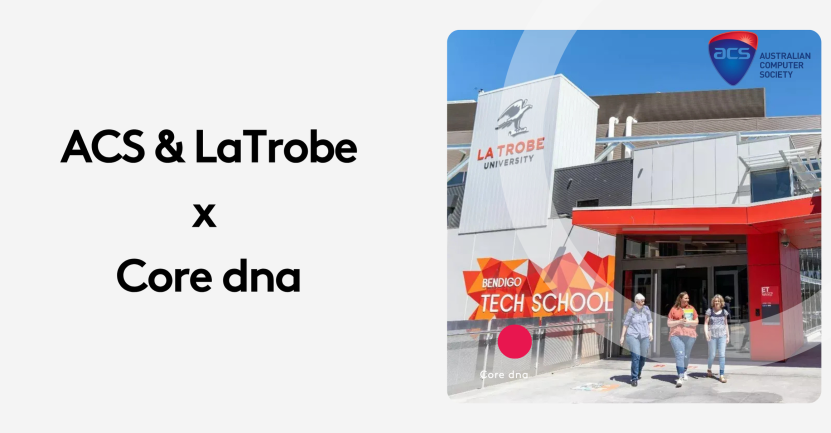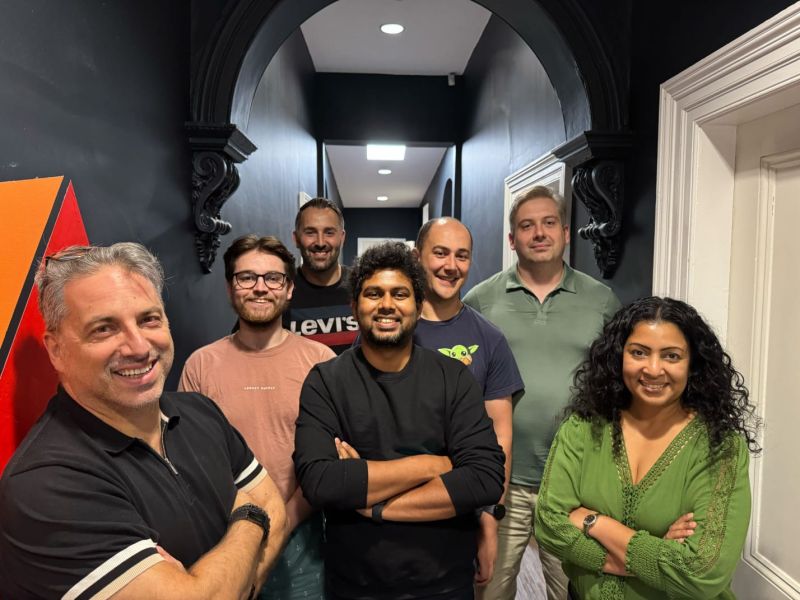Partnering with ACS and La Trobe to Build Future Tech Leaders

Summarize with
Reflections from attending ACS accreditation meeting at LaTrobe university and why collaboration between tech platforms, educators, and industry leaders matters more than ever.
At Core dna, we think a lot about the future, not just of platforms, but of the people building and using them. I recently participated in the ACS (Australian Computer Society) accreditation panel at La Trobe Business School, where I helped review how academic programs are preparing students to enter a world shaped by AI, cybersecurity, and constant digital transformation.
At La Trobe Business School, helping review how programs prepare students to enter a world shaped by AI, cybersecurity, and constant digital transformation.
It was a timely reminder that shaping tomorrow’s technology starts in the classroom, and industry has a vital role to play.
On this page:
Accreditation with Impact: Shaping Futures, Not Just Curriculum
One of the most important shifts I’ve noticed is how accreditation is no longer just about meeting technical standards—it’s about co-creating the future of education.
Accreditation gives industry leaders the chance to bring current, real-world context into the classroom. It’s where we can shape curricula around the realities of today’s working environments, not just theoretical models.
At La Trobe, we explored themes that are defining the future of tech:
- AI integration and ethics: Generative AI is already being used in classrooms. The question is: how do we ensure responsible, thoughtful use?
- Cybersecurity and professional conduct: These are now essential skills, not electives.
- Practical assessments and real-world team challenges: Students need to learn how to work like they would in a modern tech team.
This mirrors how we approach product development at Core dna. We believe in giving teams the structure and flexibility to build real things, solve real problems, and learn by doing. And that’s the same mindset we believe education needs today.
One of the lesser-known but incredibly important outcomes of ACS-accredited programs is the direct impact it has on students' futures, especially international students.
When a student attends an accredited university program in Australia, it doesn't just signal quality, it can also contribute toward migration points for permanent residency or citizenship pathways. That changes the game entirely.
It means:
- Students are selecting programs based not only on what they’ll learn but on what it can unlock for their future.
- Accreditation becomes a career enabler, not just a quality marker.
- Institutions that hold this accreditation are more likely to attract global talent.
From an industry point of view, that matters. These students, especially those who’ve made the choice to study internationally, are highly motivated, globally minded, and ready to contribute.
Accreditation is one way we help ensure they’re not just equipped with technical skills, but positioned for long-term success. And that’s good for students, for businesses, and for the broader innovation ecosystem.
What Tech Students Want and Need
Today’s students aren’t just showing up to absorb knowledge. They’re showing up with a clear sense of what they need to be ready for the real world—and they’re not afraid to ask for it.
In every conversation during the ACS panel, one message came through loud and clear: students want more relevance, more access, and more connection to the world they’re preparing to enter.
They’re asking for:
- Access to real tools from day one: Software like Tableau, Power BI, and coding environments they’ll actually use on the job.
- Projects that look like the real world: Team-based challenges, agile methodologies, and integrated feedback loops—not isolated theory.
- Mentors, not just lecturers: Exposure to people currently working in tech, so they can learn not just the skills but the context.
- Soft skills that matter: Communication, collaboration, critical thinking, and ethics are as important as technical ability.
What struck me most was how practical and grounded these requests were. They’re not asking for shortcuts. They’re asking for a better runway to get up to speed—and stay ahead.
At Core dna, this aligns perfectly with how we build for digital teams. We prioritize flexibility, hands-on tools, and real-world use cases. It’s no surprise that the next generation of talent is asking for the same from their education.
How We Deepen Our Role in Education as Industry Leaders
This isn’t just something I show up for once a year. It’s something I believe in deeply, and something we’re actively building toward at Core dna.
Being part of the ACS accreditation panel gave me a front-row view into how today’s academic institutions are working to keep up with the rapid pace of change in tech. But staying close isn’t enough. If we, as industry leaders, want to help shape the next generation of builders, we have to do more than participate. We have to engage.
That’s why we’ve partnered with La Trobe University on a PhD research initiative focused on AI’s role in digital experiences. It’s not just about research for the sake of thought leadership. It’s about creating shared understanding and mutual value, between the people building products now and the people who will build them next.
At Core dna, we’re not just building a CMS or an eCommerce solution. We’re building an orchestration platform that helps digital teams connect tools, workflows, and data into one streamlined experience. Through this collaboration with La Trobe, we’re putting our own technology and thinking to the test, exploring:
- How generative AI can support real-time personalization without compromising privacy
- How dynamic content and orchestration can adapt digital journeys in real time
- How platforms can support ethical, intelligent experiences at scale
Together, we’re researching and developing prototypes that address these challenges head-on—from AI agents that write metadata to systems that adapt based on user behavior and context.
And because we’re using our own platform as a sandbox, we get to see how future talent—researchers, engineers, and designers—interact with the technologies that will soon define their careers.
This partnership gives us direct insight into how the next generation of talent thinks, learns, and innovates. And in return, we offer them a live, evolving platform to experiment with.
Having a foot in education keeps us grounded. It makes us better product thinkers, better leaders, and more intentional stewards of what comes next. And that’s something I think every tech leader should care about.
The Gap and the Opportunity
One simple idea from the panel said it all: Why are undergraduate and postgraduate advisory boards still separate?
At first glance, it may seem like a structural detail, but it reveals something deeper: a disconnect in how we think about the student journey and the industry’s involvement in it.
The recommendation to merge these boards isn’t just about efficiency, it’s about continuity. It’s about building a bridge from academic theory to applied industry knowledge, without unnecessary silos in between.
To close this gap, we need:
- Consistent, long-term industry engagement that starts early and continues through graduation
- Tools and infrastructure that mirror what students will find in the workforce
- Project-based partnerships that give students exposure to real stakes and real feedback
This is where orchestration becomes more than a product concept. In the same way we design Core dna to connect people, tools, and workflows across organizations, education needs an orchestration mindset, where academic institutions, industry partners, and students all work in sync to create meaningful learning experiences.
Because when we close this gap, we don’t just prepare students to meet the future, we empower them to shape it.
Shaping People, Not Just Products
At Core dna, we’ve always believed in creating a platform that empowers people to build what they need. That belief extends far beyond business use cases.
Education is not a separate world—it’s where the next generation of digital thinkers, makers, and leaders are shaped. By participating in accreditation, partnering with researchers, and staying close to the classroom, we’re not just giving back. We’re staying connected to where innovation starts.
We’re proud to be part of the ACS panel and to work alongside La Trobe University on research that explores the future of AI and digital experience.
Because the future of technology isn’t just built on better tools—it’s built on better people. And we all have a role in helping shape them.





